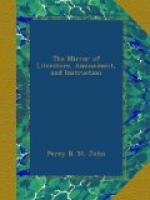The illustrative portion, also, contains many striking novelties, which, as identified with contemporary curiosity, or as performances of art, will, we are persuaded, be duly appreciated.
We abstain from further enumeration of the contents or of their respective claims to the reader’s notice. In every Number it has been our endeavour to cater for his “amusement and instruction,” so as to combine interest and novelty—or, in a homely phrase, to make each sheet like “the punch of conversation.” Thus, we have spirit, volatile and fiery in our leading articles; lemon in our pungent Notes; sugar in our “Gatherer;” and water quant. suff.—mixed in a form, which, like old bowls or drinking-glasses, is variegated with figures and scenes of the current fashion—as in our Engravings.
But we are getting too figurative, and our Christmas fare, unlike ourselves, is growing cold. So, indulgent reader, we promise to drink your health and return thanks for the same in your absence; though we had rather you were present to witness and share our exceeding great joy; and then to commence our Thirteenth Volume. Pardon this exuberance of the season: we reason with Falstaff:—“If then the tree may be known by the fruit, as the fruit by the tree, then, peremptorily I speak it, there is virtue in that Falstaff: him keep with; the rest banish.”
Christmas Day, 1828.
* * * * *
[Illustration: Portrait of Thomas Moore, Esq.]
MEMOIR OF THOMAS MOORE, ESQ.
Thomas Moore, Esq. the only son of Mr. Garret Moore, formerly a merchant in Dublin, was born May 28, 1780. He received the rudiments of an excellent education from Mr. Samuel Whyte, of Dublin, a man of taste and talent, known and respected as the early tutor of Sheridan; after which, at the age of fourteen, Mr. Moore was entered a student of Trinity College, Dublin. While at the University, he was greatly distinguished by his enthusiastic attachment to the liberty and independence of his country, which he more than once publicly asserted with uncommon energy and eloquence. His classical studies being completed, in 1799, he entered himself of the Temple, with a view to make the law his profession, and was called to the bar. In these moments, when he was not occupied with the dry technicalities and quibbles of legal writers, he amused himself with translating the Odes of Anacreon, which he published with copious notes, in 1800. Such was Mr. Moore’s youthful appearance at this time, that being at a large dinner party, and getting up to escort the ladies to the drawing-room, a French gentleman observed, “Ah, le petit bon homme, qu’il s’en va.” Mr. Moore’s subsequent brilliant conversation, however, soon proved him to be, though little of stature, yet, like Pope, “in wit, a man.”
Assuming the appropriate name of Little, our author published in 1801, a volume of poems, chiefly amatory, which, though they established his poetical reputation, were severely censured for their warmth and licentiousness. Their success, however, was very considerable, fifteen or sixteen editions being sold within a short time. In the same year he advertised a work entitled “Philosophy of Pleasure;” but this was never published.




